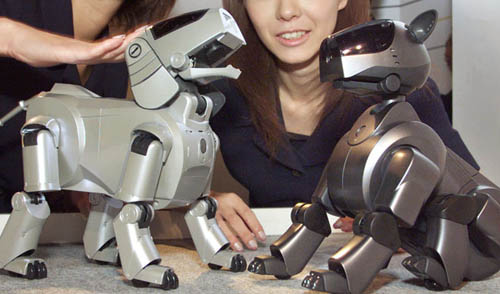Robots can replace pets in the future
According to an Australian expert, in the next 20 years, robots will become popular pets in families, even replacing real animals.
In the future robots will replace domestic pets
Jean-Loup Rault is an animal care researcher at the University of Melbourne, Australia. He said that the market for pet robots will grow in the next 10-15 years, when major technology companies around the world are racing to gain a place in this new market.

Pet robots will be more popular and can replace real pets in families.(Photo: Reuters)
" Pet robots have emerged from Tamagotchi fever in the 1990s. In Japan, many families consider robot dogs as a special member and even organize funerals after they die , " Rault wrote.
Speed of urbanization in the world is considered as one of the causes of change in the form of animal ownership is the robot . Currently, more than half of Westerners have pets in the home. In Asia, having pets is even considered an example of someone's social status. However, when the global population is expected to increase to 10 billion in 2050, Rault does not think this can be sustained.
Another fact is that in the future society, pets can become a luxury possession for those who can afford to pay and meet the demand for living space or other mental factors. , depending on the standard at the time.
Rault predicts that moving from conventional livestock to robots could be a sign of changes coming from the industrial revolution . " We are witnessing the dawn of the new era, a digital revolution that can have many effects on both the ability to own livestock, similar to the industrial revolution replacing biomass energy. for gasoline and electric motors, " said the researcher.
However, he believes that the explosion of virtual pet ownership may be a double-edged sword. On the one hand, it helps the elderly and the allergic person experience the care of pets. But when we are used to not feeding or caring for robots, this will adversely affect domesticated animals. At this point, the question is whether artificial pets can replace the beneficial effects for humans that real pets bring, and that means that the thread connects the emotions between humans and pets. will depend only on ourselves or not.
Rault takes the example of Paro , a robot that takes the form of a small seal designed to provide a positive response to those who use it. In the United States, this is considered a medical device, while designers intentionally get the idea of an unfamiliar animal to overcome the human expectations of a common pet species. Robotic patients say they know Paro is not true, but still loves and talks to it like a normal pet. In other words, robots can also arouse people's emotions.
However, the development of pet robots can also be an unforeseen danger.Bill Gates, each of the intelligent intelligence alerts (AI), could pose a real threat to mankind, while Professor Stephen Hawking said that because of the slow evolution of humans, we might not competitive and gradually replaced by AI.
- Farmers robots will replace humans in the field
- Microsoft CEO: Robot will never replace people in the future
- China built a factory to replace workers with 1,000 robots
- Controversy about the future of sex robots
- In the near future, humans can eat robots
- Minibuilder - Construction robot team has the ability to replace people
- South Korea uses robots to manage prisoners
- Why do pets make us happier?
- Prevent pets from spreading infectious diseases to their owners
- 9 unpredictable predictions about the future of robots
- 3 robots with 20 testers
- Future technologies will be popular in 2025
 'Fine laughs' - Scary and painful torture in ancient times
'Fine laughs' - Scary and painful torture in ancient times The sequence of numbers 142857 of the Egyptian pyramids is known as the strangest number in the world - Why?
The sequence of numbers 142857 of the Egyptian pyramids is known as the strangest number in the world - Why? History of the iron
History of the iron What is alum?
What is alum?